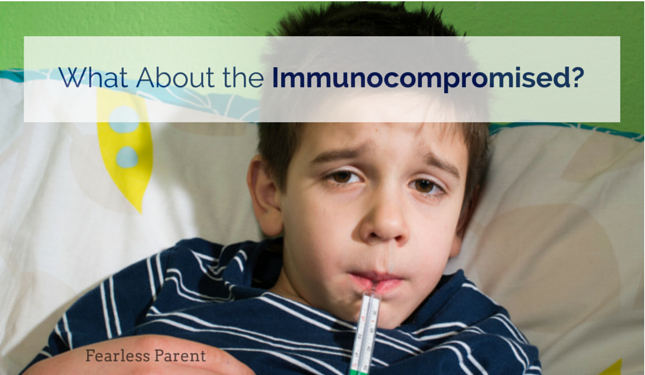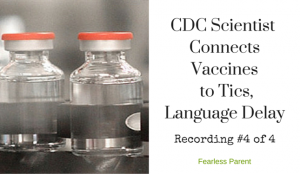Immunocompromised:
immune system suppression due to any medical condition, drug or treatment.
Proclaiming the need to protect immunocompromised children from the unvaccinated is the cause du jour, isn’t it? Let’s force-vaccinate the American population of children in order to protect all of their immune-deficient classmates. Herd immunity! Protect those that can’t be vaccinated by vaccinating those who can!
What does it mean to be immunocompromised?
For those of you who never heard the term before the tidal wave of legislation brought about by Disney 2015, the CDC says there are 3 groups of immunocompromised people:
- The severely immunocompromised without HIV
- Those living with HIV
- Those with immune deficits like spleen or kidney failure
If someone is immunocompromised it simply means that his immune system is impaired and he may get sick easier than the average person.
#1: Pediatric HIV
How many kids in the US catch HIV from their mothers? The CDC says that in 2010 we had 217 children under the age of 13 diagnosed with HIV. You read that right: an average of 4 kids per state got a new HIV diagnosis, and, due to early treatment, infections in children are on the decline.
Can these 217 newly diagnosed kids get vaccinated? Of course they can. You didn’t think the CDC was going to let them off the hook that easy, did you?
Inactivated vaccines are safe for immunocompromised people
The CDC says that the benefits of vaccinating immunocompromised children aged 6 through 18 with both Prevnar 7 and Prevnar 13 outweigh the harm.
The CDC goes even further to declare all inactivated vaccines safe for the immunosuppressed to use.
Live virus vaccines are safe for immunocompromised children, too
Does your doctor think you’re only mildly immunosuppressed? Then the CDC gives the all-clear for the MMR.
Ditto for the chickenpox vaccine. People with HIV can get that one, too.
So which vaccines are off limits for kids with HIV?
There aren’t any vaccines on the childhood schedule that school-aged children living with asymptomatic HIV can’t get.
#2: Primary immunodeficiency disease
The most common genetic condition causing primary immunodeficiency disease is Selective IgA Deficiency, which is found in about 1 in 500 Caucasians, and is less common in other races. Kids with this condition tend to have allergies and asthma, which, if you know anything about vaccines, is not a medical exemption from getting them.
Selective IgA Deficiency is genetic in only about 20% of cases, and it’s arguable that vaccines cause the other 80% of occurrences. Why do I say this? Because the autoimmune diseases associated with it are rheumatoid arthritis, systemic lupus, and immune thrombocytopenic purpura—all of which are suspected Hep B and MMR vaccine injuries.
So which vaccines are contraindicated for kids with IgA deficiency?
There aren’t any vaccines on the childhood schedule that school-aged children living with the most common form of primary immunodeficiency disease can’t get.
#3: Kidney + spleen failure
Children with kidney and spleen failure are not excused from being vaccinated. In fact, the CDC says that these conditions may require repeat vaccination or higher doses of vaccines.
Did you catch that? If you are immune-deficient because of kidney disease they’ll give you repeated vaccines, or high-dose vaccines. Never mind that vaccines are loaded with aluminum and the label on the newborn vitamin K shot says, “WARNING: This product contains aluminum that may be toxic. Aluminum may reach toxic levels with prolonged parenteral administration if kidney function is impaired.” That’s another blog post.
So which vaccines are contraindicated for kids with kidney or spleen failure?
There aren’t any vaccines on the childhood schedule that school-aged children living with kidney or spleen failure can’t get.
#4: Pediatric organ transplants
The US Department of Health and Human Services says that in 2014, 1,652 children under the age of 17 received a transplanted organ in America. That comes out to about 33 children per state.
Children are supposed to be up-to-date on all vaccines prior to organ transplant. Then, within 3 to 6 months of the surgery, they’re good to get vaccinated again with everything but the MMR-V and FluMist, although the immune response varies by vaccine.
Basically, it comes down to this chart: only the severely immunocompromised are sometimes excluded from getting some of the live vaccines.
Which vaccines are live? Kids in elementary school aren’t faced with getting the live rotavirus vaccine because they’re too old, we don’t give the live polio vaccine in this county anymore because it was paralyzing people, and we don’t give the live smallpox vaccine to anyone but our military.
So what live vaccines can’t organ transplant kids get?
There are only three vaccines on the childhood schedule that school-aged children living with organ transplants can’t get: the MMR, chickenpox, and the nasal FluMist.
#5: Pediatric cancer
How many kids in the US are on chemotherapy at any time? I couldn’t find that number, but about 10,000 kids under age 15 are diagnosed with cancer each year (that’s an average of 200 per state), but not all types of cancer respond to chemotherapy.
{Side thought: as tragic as that number is, the number of new cases of autism diagnosed at the rate of 1 in 68 comes to 58,000 per year, but the real rate today is not 1 in 68. It’s probably double that — the 2014 statistic is based on kids born in 2002 — which is more than 10 times the number of kids diagnosed with cancer.}
What about vaccinating kids currently on chemotherapy? Their doctors say they’re free to get shots for everything but the MMR and chickenpox, which are given later when they’re in remission. The 7-year-old boy whose father wanted to ban the unvaccinated from his school got his first post-chemo vaccine a few weeks after his story went viral. What was the vaccine? The MMR, of course, because the polio and DTaP vaccines aren’t contraindicated for chemo.
So which vaccines are contraindicated for kids currently in chemotherapy?
There are only three vaccines on the childhood schedule that school-aged children currently on chemotherapy can’t get: the MMR, chickenpox, and the nasal FluMist.
The real kids who can’t be vaccinated
Do you know who really can’t be vaccinated? People who developed a deadly allergic reaction to vaccines. What about people who were vaccinated and then developed a deadly allergic reaction to eating a food protein ingredient present in vaccines? Nope. No medical exemptions for them. That exemption must be earned by nearly dying on the table after being vaccinated.
The legislative list
In closing, if you find yourself talking to a legislator who says that he needs to strip you of your parental rights to make medical decisions for your child, remember these points:
#1: Most immunosuppressed kids can be vaccinated!
There are no childhood vaccines that school-aged children with HIV, IgA deficiency, or kidney or spleen failure can’t receive.
#2: Children can get MMR & chickenpox vaccines post-chemo
The only vaccines that organ transplant recipients and children currently on chemo (which average less than 230 per state at any given time) can’t receive are the MMR, chickenpox, and live flu vaccine, although the regular flu vaccine is fine. Children will be given the MMR and chickenpox once they complete chemo.
#3: Keep recently vaxed kids home to protect the immunocompromised!
If every cancer center in America knows that people on chemo need to stay away from children who are recently vaccinated with live vaccines because they shed, why aren’t recently vaccinated kids kept out of schools to protect the immunocompromised?
#4: Vaccinated kids spread disease
Vaccinated children are not spared from carrying bacteria and viruses as if the vaccine is a magical shield. Vaccinated kids are fully capable of exposing immunocompromised children to disease.
#5: Most adults are unvaccinated
Except for the natural viral infections they overcame, most adults are considered unvaccinated. Why do we put the full responsibility of so-called “herd immunity” on the kids?
#6: Vaccine injury is real
The Vaccine Injury Compensation Program paid 365 plaintiffs last year who managed to claw out an award for brain damage and other permanent injuries.
#7: What deadly epidemic?
There hasn’t been a death from measles in this country in over a decade.
The bottom line
Who do we sacrifice for whose safety?
Are there children in America who are so immunocompromised that they may become seriously ill if they are exposed to measles, chickenpox, the flu, the MMR vaccine, the chickenpox vaccine, or the live flu vaccine?
Absolutely. They should be protected as their parents deem appropriate.
But not to the point that other children are sacrificed for their safety.
Vaccines injury isn’t rare
From the House of Representatives Report discussing the 1986 National Childhood Vaccine Injury Act:
Previously unrecognized injuries associated with vaccines have become more widely known. While most of the Nation’s children enjoy greater benefit from immunization programs, a small but significant number have been gravely injured.
At a few hundred cases scattered across each state, the number of immunocompromised children is small and their cases are rare.
When it comes to the 30,000 vaccine reactions that are filed with VAERS each year, the FDA has admitted that number reported is likely only 10% of all vaccine reactions (and probably far less; this study of 33,420 vaccinations administered suggests it’s more like 3.4%). It is entirely possible that there are nearly a million vaccine reactions in America each year, yet vaccine proponents argue that they are the “rare” ones.
Whose right is it to decide which lives matter more?
So, tell us again, Mr. and Mrs. Legislator, why is it that virtually all American children are required to be vaccinated to protect a few hundred severely immunocompromised kids when the CDC says the vast majority of them can be vaccinated with almost all vaccines?
It isn’t up to our local legislature to determine which child has more worth over another. There’s a reason that question sounds so shocking. No one is equipped or entitled to make such an immoral decision. All parents are entitled to care for their children as they see fit.
Levi Quackenboss’s blog can be found here.














Thank you! Keep up this good work. I wish the people that need to read this would read this!! Send copies to the Obamas, Jon Stewart, & Elizabeth Warren to begin…
There are many other diseases that make the immune system compromised. Just think of autoimmune disease based on candida, which is no longer an issue for adults only. The immune system is also compromised once a bigger stress is at fault (e. g . a kid who’s parents go through divorce); the immune system is very weak during spring time when is recovering from lack of nutrition and sun during winter and in the fall. Also, when there is lack of nutritious food ( which most american families are at risk). I could continue on and on…
I care about my kid and only my kid and anyone who says they care about about others kids as much as their own is a damn liar. Bottom line, I work really hard to keep my kid healthy so imunnocompromised kids are not my problem, they’re their parents problems. Even if my kid was immunocompromised, I would NEVER ask someone else to protect my kid!
My daughter is an organ transplant recipient. She can never receive the MMR, contrary to what this article states (lumped in with post-chemo). She will be on immune suppressive drugs for the rest of her life. She was exposed to measles in our pediatricians waiting room (along with all the babies under 1 who did not yet receive the MMR. My daughter, and all of those babies had to be admitted to the hospital for IV immune therapy to prevent a measles infection, which would be very serious for her. Yes, my daughter is MY problem, as you so kindly put it, but she doesn’t need to have added hospitalizations/illnesses which will affect her more severely just because other parents put their child, and the much smaller risk of an adverse vaccine reaction first. Especially when it comes to infection, we need to care about each other.
The statement with regard to organ transplant said recipients must be up-to-date on all vaccines prior to the transplant, but do not receive vaccines for MMR-V or Flumist afterward– by that I mean they never again receive the live viruses: measles, mumps, rubella, varicella, or the live nasal influenza spray. So, there is no contrary sentence to what you are saying.
I am sorry for the hardship your daughter’s illness has brought to her life and yours. I agree that we need to care about each other, which includes not expecting parents to sacrifice their toddlers’ lifetime health in order to protect someone else, not to mention the vaccine-strain measles outbreaks that also put your daughter at risk.
Why don’t we just start bloodletting again? Or perhaps we should start lobodomies again.
I agree with Adriana. I don’t mean to be insensitive when I say this, but why should parents of severly immune compromised children expect the rest of the world to sterilize itself so that their child doesn’t get sick. I keep my kids home when they are sick, out of consideration for others. I sanitize shopping carts when we are through if I have to take a sick kid shopping with me. If my kid were immune compromised, I would NOT expect everyone else to make sure that the world was safe for my kid…that’s MY job. My job as a parent is to watch out for MY kid…and I do that, while being as considerate as possible toward others, without harming my own children in the process. I often kept my son home from church classes when other kids were sick because I had a newborn. MY RESPONSIBILITY. My unvaxxed children don’t spread more disease than any other vaccinated child, because they are only exposed to the same things that all the other children are exposed to. We don’t have a secret stash of vaccine-preventable pathogens at home just so we can go out and spread fear and sickness. We live in the same world, Are exposed to the same pathogens, and do our best NOT to spread those common pathogens around beyond our family. Sometimes it helps, sometimes NOTHING seems to help. That’s Life. I would never ask for anyone else’s child (or millions of children) to risk harm just so mine can go about with a false sense of security.
This is certainly a really interesting and complicated issue, and it is one where we need to consider what our responsibility to others are. I always come back to the sense that we must do things out of freedom, which involves an awareness of our connection to others. When someone donates a kidney to a relative, that is out of love and freedom. But injecting toxins with vaccines into an infant because some day he or she may come in contact with a child with HIV or cancer? In Russian fairly tales, the protaganist (Ivan) often meets the witch – Baba Yaga – who is fierce and wise; she has something he needs. She asks him “do you come by compulsion or by free will?” If he answers one way or the other she eats him. So it is a lesson to avoid hyperbole, simplistic and mechanistic thinking, to raise our level of conversation and consciousness so we can make a judgment in the moment, (not judgments of each other) that makes sense for ourselves and the collective, for the other. “Rules are for the obedience of fools, and the guidance of the wise” – a quote from a commander in the RAF in the Battle of Britain. In the Fairy tale, Ivan answers her by saying something like “75% free will, 200% compulsion” or “everything in my life has brought me to this place, yet I chose every step along the way.” What is this issue – vaccines, immunocompromised children, autism – trying to teach us? how did we participate in getting here? and how do we proceed in freedom, on the needs of the moment? to say yes to science and yes to a parents instinct and yes to true freedom?
Great site and information. However, i see that despite all the great info on vaccines that totally contradict the official version, on the other hand you totally acknowledge the official version about the existence of HIV, which has never really been proven, and it’s just another myth, maybe the greatest of our time, imposed by sheer force, propaganda and threats. DON’T GET ME WRONG, I’m not talking about AIDS, which is an artificial label, but for diseases that DO EXIST. What i’m talking about is the supposed cause of AIDS, the infamous HIV, the Al Qaeda of viruses. So simple to realise is its non-existance, that TESTS DON’T DETECT THE VIRUS: they detect antibodies that Big Pharma says appeared because the HIV is there. And then, even if the virus existed, who needs it? AIDS, or rather, immunodefficiency, is caused by, among other culprits, abuse of antibiotics, abuse of drugs, malnutrition, contaminated drinking water, etc. And you treat that with chemotherapy??? Please do your homework in this issue as well as you have done it with vaccines. Thank you 🙂
Hi, Adrian. Thanks for writing. Our guest blogger used government sources to make the argument about the Immunocompromised. This post wasn’t the place to tackle AIDS/HIV but you are absolutely right to challenge us. I agree with you. Our Medical Director, Dr. Kelly Brogan does, too. Here’s a post she wrote last year: HIV & Pregnancy — Pharma Abusing Women?
Children with HIV, AIDS, HEP B and many other diseases are allowed to attend school and their privacy is protected! But unvaccinated children are treated like the disease carriers! Also the 7 year old boy you referenced whose father wanted to ban unvaccinated children from his son’s school; did you know his father works for GlaxoSmithKline? Yea the pharmaceutical companies will use any child from the 10 day old baby who was supposedly exposed to a measles patient at the doctors office (patient with measles was fully vaccinated) and the mother wrote a blog on Huffington Post thanking unvaccinated people. Well, the baby’s grandfather Edward Krawitt worked for GlaxoSmithKline.
Please wear a mask and be responsible for your own health instead of relying on everyone else to cater to your needs.
My son is more immune compromised than most. Born without a Thymus gland he is unable to create the cells needed to attack a virus, or bacterial, fungal, parasitic….infection. There is, however, a cure. Until he is cured, I expect the rest of the world to carry on in their ignorence, swimming in a daily sea of infection. He and my family will report back to our home, once released form the hospital, and have groceries delivered to prevent public exposure for all family memebers living with him. Case and point, if your child is subject to death from infection, stay away from infection. Simple as that. The sacrafices we make to save are childrens life should not be considered sacrifice at all.
You are leaving out a large portion of kids that are made immune compromised via drugs used to treat autoimmune diseases. The medications used to treat them cause the children to be immune compromised and unable to get any live vaccines.
Sad thing is… Anyone can have an opinion about not vaccinating their child, which is PROVEN effective (only only if there is a collective effort) until their kid is the one who can’t. Be sensitive… It hurts to have a child who is normal as yours in practically everyway but can’t actually live as a normal child bc others don’t make decisions that protect the whole
Hi, Veronica.
Thank you for writing. I respectfully disagree. The federal government knows that vaccines cause catastrophic harm and death to some who receive them. This is why vaccine makers sought and obtained near blanket liability protection and there is a National Vaccine Injury Compensation Program that has paid out nearly $4 billion to thousands of families (see 1986 National Childhood Vaccine Injury Act for more details). And vaccine effectiveness is a huge topic — suffice it to say that vaccines don’t always work. This is not disputed. But every dose of vaccine given exposes the recipient to serious health risks.
We must not privilege some lives over others. If parents want vaccines for themselves or their children, it is their right to get them. Many people do. We are speaking about a minority of people who don’t want to and a tiny minority of people who can’t.
In this equation, we must not privilege some lives over others. Whether it’s the sick child undergoing chemotherapy who cannot be vaccinated or the healthy child who receives a mandated vaccine and dies. We have deep compassion for both. But our society must not be one that imposes a false moral equivalence… a heart-shuddering Sophie’s Choice.
When lives damaged by vaccines are less important than lives damaged by disease, this is an injustice.
Vaccination must be a choice.
There is a separate conversation about the validity of our ideas regarding contagion. This point notwithstanding, the logic of forcing all children to be vaccinated to protect the sick does not hold up. If a child is too vulnerable to be exposed to measles, the same must hold true for any number of other diseases for which there are no vaccines. Rather than legislating compliance via coercive vaccine mandates, perhaps our society should reconsider whether the child is robust enough to be in school.
Best wishes,
Louise Habakus
Great article. Is this article ok to translate to swedish?
I am not gonna change or add anything to it.